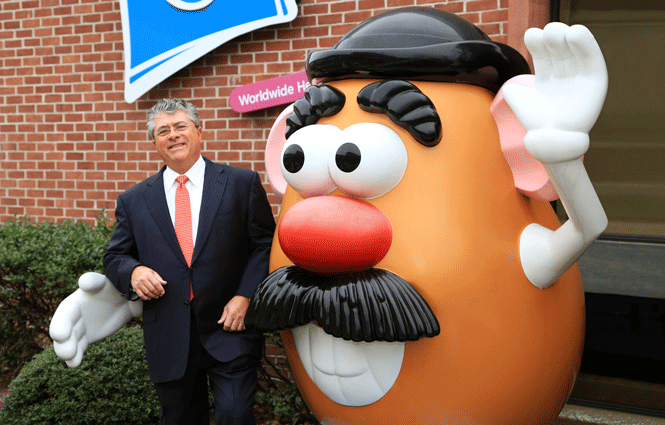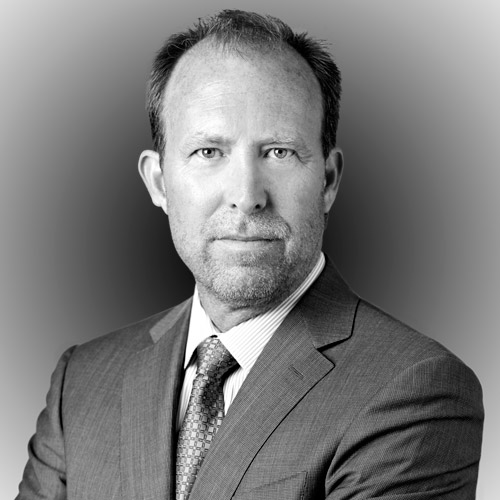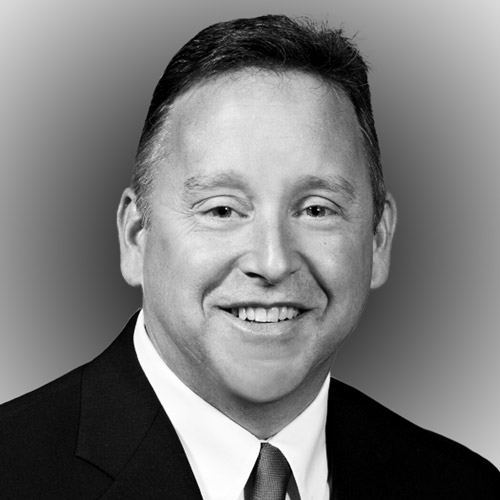When Martin Trueb moved to the South American city for his first job after earning his master of business administration, finance, and international business from University of California, Berkeley, he didn’t know what to expect. The sprawling seaside city of Rio de Janeiro, Brazil, is known for its pristine beaches and bordering gritty favelas. It’s a city of poverty, wealth, history, and energy.
“It taught me a few things,” Trueb says. “One: visiting a place and living in a place are quite different.”
While he was there, Trueb saw the Christ the Redeemer statue, learned to speak Portuguese, and hiked Sugarloaf Mountain. And although his experience working in Brazil was brief—he was only there a year before his company moved him to Miami, Florida—the lessons he learned would pave the way for a career in international finance and working with foreign clients.

Today, Trueb is the senior vice president and treasurer of Hasbro—the company best known for iconic brands including Monopoly, Transformers, Play-Doh, and My Little Pony. Over the past few years, Hasbro has grown significantly. As Trueb puts it, when he started at the company more than eighteen years ago, Hasbro toys and games were primarily “on the kitchen and living
room floor.”
Today, in addition to traditional toys, Hasbro brands can be found on screens, too: the company created its own wholly owned studio, Hasbro Studios, to create entertainment-brand-driven storytelling across media, including television, film, and more. Annually, Hasbro pulls in over $4 billion in sales, and its products can be found in more than 120 countries, from Argentina to Romania to New Zealand.
Officially, Trueb’s role at Hasbro consists of managing Hasbro’s treasury operations, insurance activities, and order-to-cash activities. However, Trueb says what he most enjoys is that his job is not a traditional treasury role. He also deals with risk management and insurance activities. Due to Hasbro’s growth product-wise and abroad (Hasbro recently opened in Brazil and Russia, and expanded in China), Trueb must consider a slew of factors, such as how to finance and insure television production, how to deal with fluctuating foreign exchange rates, and how to ensure the infrastructure is in place for foreign operations, in addition to deciding how to best invest and use the company’s finances. “Treasury has enormously changed since I’ve been [at Hasbro]. Not only within the business, but the entire financial environment,” Trueb says.
Ultimately, much of Trueb’s job comes down to making sure business runs smoothly, with foreign economies and clients, which involves more than crunching numbers. “We’re in many locales we weren’t before, and they all bring their own foreign management and cash management challenges,” he says. “You need to really understand the business and be a partner. Instead of just being good at what we do, we need to make sure we’re good for everybody else.”
Trueb believes that his time working and living in different places around the world and in the United States has taught him to be less judgmental and to look past superficial cultural differences to understand what people are trying to convey. Just because someone might not be completely fluent in English, he says, doesn’t mean they don’t know exactly what they’re talking about.
Trueb earned his bachelor’s degree in science from California State University–Fresno and joined Schering-Plough in Brazil after earning his master’s degree at University of California, Berkeley. In 1981, he joined RJR Nabisco, a tobacco and food product company, which took him to Florida, North Carolina, Georgia, and New York—not including near-weekly travel. Trueb then went to work for Amway before joining Hasbro in 1997. He says his time at Hasbro is the longest he has been in one place and with one company.
Trueb is also a member of the International Finance Group and Treasurers Group of Thirty, serves on the Advisory Board of International Treasurer, and is a member of the Governor’s Workforce Board of the state of Rhode Island.
“As I look back on it today, what I learned was that you can find reasons to be happy or unhappy wherever you are,” Trueb says. He emphasizes—especially for individuals early in their financial career—taking time to gather experience in order to make good decisions.
For example, Trueb says it was through his experience at RJR Nabisco that he was able to help Hasbro through financial challenges in the 2000s. “It’s more than getting the right answer,” he says, “It’s understanding the process, too.”
Trueb advises young workers to know when to move—whether that’s geographically, within a company, or career-wise—and be open to it. For Trueb, lateral development is just as important as upward development. “You have to be where the opportunity is,” he says. “Your ability to go to opportunity is critical, because opportunity will seldom come to you.”
Trueb says that each place he has lived throughout his career thus far has had its pros and cons. However, in the future he wouldn’t mind living somewhere with a year-round temperate climate. “At the end of the day, I’m happy where I am,” he says. “I have fond memories of everywhere I’ve lived.”

